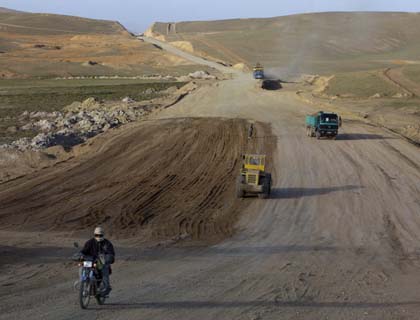KABUL - The Ministry of Finance and the World Bank on Sunday signed a $125 million grant, funded by the bank's International Development Association, to rehabilitate rural infrastructure destroyed during years of conflict.
The project includes maintenance of secondary and tertiary rural roads as well as the construction of bridges. The rehabilitation works would be implemented under the Afghanistan Rural Access Project (ARAP).
ARAP aims to enable
rural communities to benefit from improved access to basic services and facilities through all-weather roads and increase the number of people living within two kilometers of all-season roads.
Of the project's cost estimated at about $332 million (16 billion afs), the World Bank financed $125 million (6 billion afs) and the Afghanistan Reconstruction Trust Fund (ARTF) the remaining $207 million (10 billion afs).
"Given that nearly eighty percent of Afghans live in rural areas, building rural infrastructure is crucial for the people's well-being and prosperity, as well as for economic growth," said Deputy Finance Minister Dr. Mustafa Mastoor.
"Connecting villages with each other and with towns and cities will not only improve villagers' welfare but also help bring peace, stability and prosperity. If one village is connected with another, new employment opportunities will open up, access to basic services such as health and education will improve and businesses will prosper," he added.
Rural Development Minister Mirwais Barmak, addressing a news conference, called the rural road project a priority of the government. The scheme was initiated a decade back, he recalled, saying that with the support of the World Bank and ARTF, the government had been able to rehabilitate or construct more than 10,500 km of secondary and tertiary road networks across the country.
As the nation started to emerge from the conflict in 2001, only a tenth of the estimated 130,000 km of roads was in good condition. Today, Afghanistan's tertiary road network is estimated at 80,000 km, of which only about 7,000 km are accessible to motor vehicles in all seasons, the rest are tracks mostly inaccessible.
Among the roads that remain accessible to vehicles all year, an estimated 5,000 km are believed to be in maintainable state, while the rest are in poor condition and need rehabilitation. Under the program, the minister added, 1,600 km canals and small bridges had also been built.
As part of the project, Public Works Minister Eng. Najibullah Awjan promised that his ministry would construct 1,000 kilometers of roads in addition to maintaining secondary rural roads.
The ARAP is a series of World Bank projects that has supported the government's National Rural Access Program (NRAP) over the past ten years. To date, with the support of the World Bank and ARTF, the government has been able to rehabilitate or built more than 10,500 km of secondary and tertiary road networks across the country, which have also created over 16 million labor days' opportunities for Afghans.
"Alleviating poverty through interventions that help create jobs, provide access to basic services and create an enabling environment to private sector investments remains the World Bank's paramount focus in its support of government efforts," said World Bank Country Director for Afghanistan Bob Saum.
"The rehabilitation of rural infrastructure so far has led to encouraging improvements in rural livelihoods. Many villages are, for the first time, connected to markets. People have easy access to health facilities and more children are able to go to school.
"We will continue to support government efforts in sustaining this progress and help it to expand into villages where Afghans still wait to benefit from rural development activities," added Saum. (Pajhwok)

